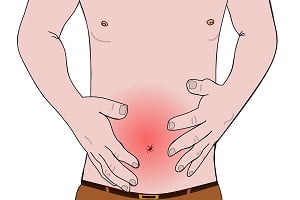Types of Diarrhea
- Updated on: Jul 5, 2024
- 3 min Read
- Published on Dec 26, 2020

Diarrhea is defined as three or more watery stools in 24 hours. Diarrhea can be watery, bloody, mucoid, and loose. There are many types of diarrhea, which are explained below.
Osmotic Diarrhea
It is the type of diarrhea that occurs due to indigestion of non-absorbable solutes. Osmotically active solutes prevent proper gastrointestinal absorption of water and electrolyte. It has a large volume and is watery. Water absorption occurs by osmosis in the intestine followed by resorption of osmotically active electrolytes like sodium. When resorption of such active electrolytes does not happen properly, they remain in the intestinal lumen and cause hindrance in the water absorption. This unabsorbed water in the intestinal lumen is excreted as watery diarrhea.
Osmotic diarrhea is mainly caused due to malabsorption of lactose derived from dairy products and is also known as lactose intolerance. Normally, lactose gets cleaved into monosaccharides by the action of lactase. However, in the absence of lactase, lactose is not properly metabolized. This osmotically active and unabsorbed lactose remains in the intestinal lumen and may lead to osmotic diarrhea.
Infectious Diarrhea
Infectious diarrhea is a form of acute diarrhea that lasts for less than three weeks. A variety of microorganisms, like bacteria, viruses, and protozoa, can cause infectious diarrhea. Staphylococcus aureus, Clostridium perfringens, Vibrio cholera causes diarrhea by the production of toxins known as enterotoxin. Enterotoxin is a protein toxin that targets the intestines and causes food poisoning and cholera. Clostridium difficile, ETEC, and STEC Escherichia coli act by producing cytotoxins (toxins that affect the cells). Cytotoxins are adhered to the intestinal mucosa and guide them to release inflammatory mediators, causing inflammation in the intestine and hindering digestion in the intestines. Invasive microbes like Salmonella, Campylobacter jejuni, Vibrio parahaemolyticus, Yersinia pestis, Shigella, EIEC Escherichia coli also produces cytotoxins that impair the digestion in the intestines. Giardia lamblia acts by adhering to the large or small intestinal epithelium. It prevents mucosal cell death and generally causes watery diarrhea. Bacteria producing cytotoxins release blood and inflammatory cells in the stool.
Secretory Diarrhea
This is similar to that of osmotic diarrhea and is also characterized by the release of large volumes of watery stools. It can cause little pain and continues even without the intake of food. It is usually caused by derangement of either small or large intestines and gastrointestinal electrolyte and water absorption. Several microbes can cause secretory diarrhea by increasing the secretion from the small intestine. Fecal impaction is one of the causes of this type of diarrhea. Impacted feces cause chronic irritation within the large intestinal mucosa that causes increased secretion.
Read About Diarrhea: Causes, Symptoms, Complications, Treatment
Dysmotility Diarrhea
Due to excessive bowel motility, the time of transit of ingested food in the elementary canal decreases. Thus, proper digestion and absorption of food in the gastrointestinal tract is not done, and this causes diarrhea. Dysmotility is a condition in which the digestive system’s muscles alter its strength, speed, and coordination with digestive system organs. In the normal state, the secretions and liquefied food are pushed towards the waves of muscular contraction. But due to impaired muscle movement, the food gets trapped in the intestine. This can also cause nausea, vomiting, bloating, and even malnutrition.
Steatorrhea
It is when the stool has a high lipid content, which gives it a foul smell and oily texture. It is caused due to improper digestion of lipids. It occurs due to defects in synthesis or transport of bile acids or the small intestine’s incapability in the absorption of lipid–bearing micelles. Prolonged steatorrhea can cause deficiency of lipid-soluble vitamins like A, D, E, and K, and it can also lead to sudden weight loss.
FAQs
What Is the Main Cause of Diarrhea?
Diarrhea is caused due to indigestion of food in the intestines and due to improper bowel movement.
How Is Cholera and Dysentery Different?
Cholera is a diarrhea which is caused by bacteria and is characterized by severe dehydration whereas dysentery is described as inflammation in intestine with blood in stool.
For How Long Acute and Chronic Diarrhea Lasts?
Acute diarrhea is described as 3 – 4 episodes of watery stools in 24 hrs, it doesn’t last more than 14 days whereas, chronic diarrhea last more than 14 days.












